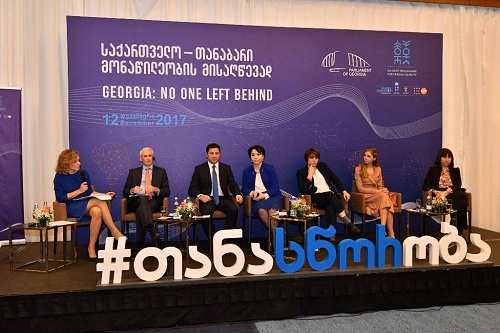
Senior Lawmakers Voice Support to Mandatory Gender Quotas Bill

Panel speakers at a conference of the Parliament’s Gender Equality Council with a hashtag sign reading tanastsoroba (equality) in Georgian, December 12, 2017. Photo: parliament.ge
Senior lawmakers from three parliamentary parties of Georgia, including the ruling Georgian Dream-Democratic Georgia (GDDG), the European Georgia and the United National Movement, voiced their support to the mandatory gender quotas bill, which, if approved, would set mandatory quotas for women to help increase the number of female members in the Parliament and Sakrebulos (municipality councils).
The lawmakers spoke on the gender quotas bill at a conference on December 12 organized by the Parliament’s Gender Equality Council, and supported by the United Nations Development Program in Georgia.
GDDG’s Eka Beselia, who chairs the committee for legal issues, said in her remarks at the conference that the bill was “timely” and had “a good objective.” “We may be late as it would have been better if we adopted the bill earlier, but we can improve it now and decide on it as soon as possible,” Beselia noted, adding that the tentative date for its adoption would be early spring of 2018.
Archil Talakvadze, leader of the Georgian Dream parliamentary majority, hailed the bill as well, saying that the majority group “would take strong leadership for adopting the quotas bill with confidence.” “We believe that the mechanism of quotas is the best decision in a mid-term perspective in order to increase women’s participation in the Parliament, Sakrebulos and generally in politics,” he noted.
Tina Bokuchava of the opposition United National Movement also expressed her support to the initiative, saying that the introduction of mandatory quotas “as a temporary measure” was necessary and the bill would be supported by “a majority, if not all [UNM] faction members.” “Of course, it would be better if it applied to the majoritarian system … but better to adopt what we are discussing today than adopt nothing,” she noted.
European Georgia’s Elene Khoshtaria said she was “personally against quotas as a woman” as it “is demeaning both ideologically and psychologically,” but promised “not to generalize” her personal position on the matter and added that the party “would very actively and seriously consider” supporting the bill.
Parliamentary Chairman Irakli Kobakhidze, who also addressed the conference, endorsed the bill as well. Kobakhidze said in his remarks that the financial incentives that current political party regulations envision to promote women’s’ representation “are realistically, rather ineffective,” and that it was “necessary to think of other measures to encourage women’s participation in politics.”
“Mandatory quotas system would be the best measure for that … If approved, the bill will increase women’s representation in the Parliament at least to 25% that will be a significant progress from the current figure of 15%,” Kobakhidze noted, adding that “evening out” the number of women and men in the Parliament was not “a goal in itself,” and that the final objective was to ensure “equal opportunities for development and self-realization of women and men in public life.”
MP Ada Marshania of the Alliance of Patriots, who also attended the conference, said in the Q&A session that the faction would also endorse the legislative proposal.
Context
The legislative proposal, which has been drafted by the Task Force on Women’s Political Participation, a coalition of local and international organizations that advocate for gender equality and women’s political participation, and submitted to the Parliament with 37 000 signatures, envisages the introduction of the so called “zipper” system, where male and female candidates will appear alternately on party lists of candidates for the parliamentary and municipal elections.
According to the same bill, if a parliamentarian’s or Sakrebulo member’s mandate is terminated earlier than the end of his/her term, the next candidate of the same sex will take a seat in replacement.
The bill was supported by the parliamentary committee for legal issues unanimously on October 5, after being approved by the committees for human rights and regional development. The legislation is pending submission to the parliamentary bureau, which will decide whether to put it to plenary voting or not.
If the bill is approved, it will apply to the party-list component and will result into at least 38 female lawmakers in the next parliament and at least 75 female lawmakers from 2024, when the country is to transition to the fully proportional parliamentary representation (currently, 77 seats are allocated based on proportional, party-list system and remaining 73 seats are distributed to majoritarian MPs from single-mandate constituencies).
Initiatives on setting mandatory quotas for women were discussed by the previous Parliamentary convocation as well. A proposal submitted by a group of civil society organizations offered the introduction of the “zipper” system; according to another proposal, sponsored by two GD ruling coalition lawmakers, political parties would be obliged to place women in every third position on their list of MP candidates. A part of lawmakers supported the idea, but the discussions on gender quotas failed to go beyond committee hearings.
The Georgian legislation currently envisages financial incentives for parties to include more women in their list of candidates. Rights groups, however, have been saying that this incentive has failed to address the under-representation of women in the Parliament (there are 23 female lawmakers currently).